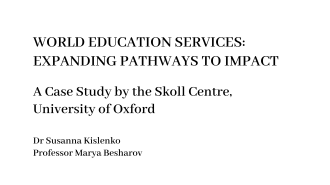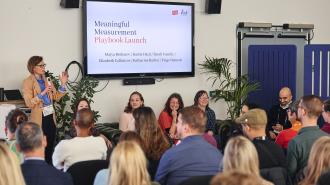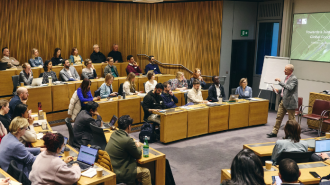The Skoll Centre Publishes New Case Studies Series on Social Innovation
The Skoll Centre has published a new series of case studies featuring fourteen social enterprises that are using different forms of innovation to tackle social and environmental issues.
Today, social entrepreneurship is a major economic and social force on the global stage, with up to 30 million social entrepreneurs around the world contributing roughly $2 trillion to global GDP (Schwab Foundation for Social Entrepreneurship and World Economic Forum, 2024; British Council and Social Enterprise UK, 2022). Across a wide range of issues, social enterprises share a common trait: they use innovation to create and scale impact, not just to drive financial performance.
Each case study in this new series sets out each organisation’s key innovation activities, the challenges they have faced in pursuing different innovation pathways and the learnings gained. The rich insights from the cases span a range of social challenges, sectors and geographies.
Cynthia Rayner, Visiting Fellow at the University of Oxford Saïd Business School’s Skoll Centre and author of the case studies, said: ‘I truly enjoyed getting to know this incredible group of social entrepreneurs and their organizations. These case studies are crucial since they highlight the on-the-ground reality for a diverse set of organizations, showcasing the opportunities and challenges that social entrepreneurs face when developing innovative solutions and business models for social issues. Through the interviews, I was inspired by the resilience and creativity of these entrepreneurs, with each story offering a unique lens on how to grow an organization that combines purpose and innovation.’

Marya Besharov, Professor of Organisations and Impact at Saïd Business School, University of Oxford and Skoll Centre Academic Director, said: ‘For over 20 years the Skoll Centre has been advancing the work of social entrepreneurs and the positive impact they have in addressing social and environmental issues. In this new case study series, it’s clear each enterprise is engaged in some form of systems innovation to succeed – shifting policy, engaging communities, supporting research and building networks. Our mission at the Skoll Centre is to help social entrepreneurs transform broken systems in order to scale social impact, and we hope by sharing best practices across different geographies and sectors, we can continue to help build a positive movement of change’.
These case studies were developed as part of the Skoll Centre’s contribution to the World Intellectual Property Organization (WIPO)’s Global Innovation Index 2024: Unlocking the Promise of Social Entrepreneurship. This new report sets out the state of entrepreneurship, how social enterprises innovate to drive impact and what policies are needed to unlock the potential of social entrepreneurship.
The social enterprises featured in the case studies are: Bandhu, Community Design Agency, Eco Femme, Faitrasa, GBE, Greenhope, Grupo Mamut, iKure, Peek Vision, SmartStart, Soil, Tebita, Thaki and WeRobotics.
Explore the case studies here.
Join the Skoll Centre either online or in person in Oxford for our latest Insights for Action seminar and the UK launch of the 2024 Edition of the Global Innovation Index Report and its theme of Social Entrepreneurship. Skoll Centre Academic Director Professor Marya Besharov will be joined in conversation by key experts alongside Andrew Bastawrous, CEO of Peek Vision Ltd, one of the case studies featured in the report and case study author and Skoll Centre Visiting Fellow, Cynthia Rayner. Register for the event here.
Sign up for regular news from the Skoll Centre direct to your inbox here.




